Nathan J. Winograd's Blog, page 5
January 22, 2021
This Week in Animal Rights (Jan. 18, 2021)
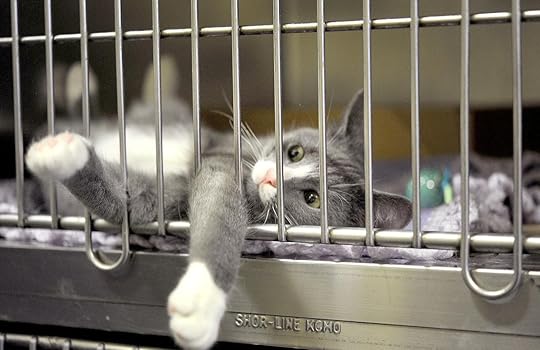
Bella Vista, AR, reported a 100% placement rate for dogs — the first time it did not put down any dogs — and 99% for cats. Dogs identified as “pit bulls” are welcome again in Commerce City, CO. Tuskegee University ends the practice of using live dogs for terminal training surgeries. A group of California sea lions surf during a day of enormous swells. Researchers subjected a mouse to pain in order to see if another mouse watching suffered, too, even though we already know that they do; an exercise in cruelty. Major Biden, the first shelter adopted dog to occupy the White House, was inaugurated. Candidates for New York City Mayor were asked to embrace legislation that will mandate a No Kill policy for municipal pounds. We celebrated dreaming cats and squirrel appreciation day. And, finally, our message is succeeding: more people are adopting and fewer people are shopping for pets.
In case you missed it:
Arkansas is on the map! Bella Vista, AR, reported a 100% placement rate for dogs — the first time it did not put down any dogs — and 99% for cats. It is part of the most exclusive club in the movement — those placing 99% or more of the animals.Out of the shadows and into the sun. Joining Denver and Aurora which have recently done the same, dogs identified as “pit bulls” are welcome again in Commerce City, CO.Thousands of dogs have gone from a local pound to Tuskegee University to be used for training students on “live dogs before killing them…” No more. The director of the teaching hospital confirmed that, “The terminal labs have ended permanently. They will not resume.”A group of California sea lions surf during a day of enormous swells, proving that all animals are entitled to the “unalienable rights” of ife, liberty, and the pursuit of happiness.Researchers subjected a mouse to pain in order to see if another mouse watching suffered, too. The answer, of course, was Yes. While Science magazine is hailing the study that “Mice feel for each other,” we already knew that. The study was nothing more than an exercise in cruelty.Major Biden, the first shelter adopted dog to occupy the White House, was inaugurated with dogs from across the country in attendance online.Candidates for New York City Mayor were asked to embrace legislation that will mandate a No Kill policy for municipal pounds.Some scientists are not convinced that cats dream. Here’s why they are wrong.We celebrated squirrel appreciation day.And, finally, our message is succeeding: more people are adopting and fewer people are shopping for pets. “In 2008, 41% of dogs in the U.S. were purchased through breeders or at pet stores, while about a quarter were adopted, such as via animal shelters or rescues… By 2018, the latest year for which data is available, 28% of dogs were purchased and 36% adopted.” Of the $99 billion spent on animals last year, the amount spent to purchase animals continues to decline and is “the smallest area of total pet industry spend.”
————-
Have a comment? Join the discussion by clicking here.
January 15, 2021
This Week in Animal Rights (Jan. 11, 2021)
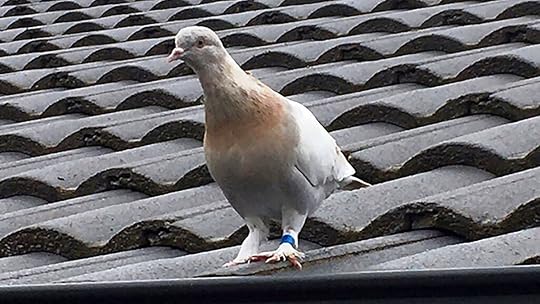 The Austrlian government’s decision to kill Joe the Pigeon resulted in worldwide condemnation. They have now reversed course.
The Austrlian government’s decision to kill Joe the Pigeon resulted in worldwide condemnation. They have now reversed course.Champaign County, IL, Animal Control has announced changes to procedures after a woman was told that Dada, her missing dog, was at the facility, but “the euthanasia technician didn’t get the message, and Dada was put down…” Dogs identified as “pit bulls” are welcome again in Aurora, CO. We may be on the verge of a crisis as almost 20 million dogs and cats live in a home that is not current on their rent or mortgage payment. A rescue rights law in California led to a 700% increase in rescue lifesaving. United Airlines joins Delta Air Lines in announcing that it will no longer ban service dogs based on the dog’s alleged “breed.” Major, the pup adopted by President-elect Joe Biden, is the first shelter adopted dog who will occupy the White House and he is getting his own inauguration. The number of dogs who have been killed by tainted Sportmix pet food is now at least 70 and the number of dogs who have been sickened by it is over 80. We veganized a recipe for “breakies” (half-bread/half-cookie) created by Google A.I. And Australia wanted to kill Joe the Pigeon because they claimed he was “non-native,” then reversed course when they thought he was. It shouldn’t matter either way.
In case you missed it:
– Champaign County, IL, Animal Control has announced changes to procedures after a woman was told that Dada, her missing dog, was at the facility, but “the euthanasia technician didn’t get the message, and Dada was put down…” The changes don’t go far enough.
– Out of the shadows and into the sun. Dogs identified as “pit bulls” are welcome again in Aurora, CO. The City Council repealed its ban.
– Almost 20 million dogs and cats live in a home that is not current on their rent or mortgage payments according to a recent survey. And with a moratorium on eviction set to expire at the end of this month, we may be on the verge of a crisis.
– Since passing a rescue rights law, the number of animals transferred to rescue groups in California rather than killed went from 12,526 animals a year to 99,783 — a nearly 700% increase.
– United Airlines joins Delta Air Lines in announcing that it will no longer ban service dogs based on the dog’s alleged “breed.” This was not a voluntary decision. Both were forced to do so. And while that is good news, it does not go far enough.
– Major, the pup adopted by President-elect Joe Biden, is the first shelter adopted dog who will occupy the White House. And he is getting his own inauguration on January 17.
– The number of dogs who have been killed by tainted Sportmix pet food is now at least 70 and the number of dogs who have been sickened by it is over 80. And per the FDA, “Reports submitted only to the pet food manufacturer are not shared with FDA and are not a part of this count.”
– Breakies look like cookies, but they have the fluffy consistency of muffins. The recipe was generated by Google artificial intelligence. We veganized them.
And, finally, after a Melbourne man found a dehydrated, hungry pigeon he named Joe, Australian officials announced their intent to kill Joe because he was thought to be “non-native.” Although people from all over the world pleaded with officials to spare him, “Acting Prime Minister Michael McCormack showed no mercy… ‘If Joe has come in a way that has not met out strict biosecurity measures, then bad luck, Joe. Either fly home or face the consequences.’” But thankfully Joe is being spared after officials admitted their error and “concluded that Joe the Pigeon is highly likely to be Australian.” It shouldn’t matter. Killing Joe would have been violent and cruel. It would have been unethical. It would have been hypocritical. And it would have been unscientific. Nativism/Invasion Biology is not science. It’s philosophy — and a particular violent one at that. In the neighborhood of bad ideas, it is one of the most ramshackle houses on the street.
————-
Have a comment? Join the discussion by clicking here.
January 13, 2021
Sportmix pet food kills 70 dogs
 The number of dead dogs reported by the FDA represents a minimum. According to the FDA, “Reports submitted only to the pet food manufacturer are not shared with FDA and are not a part of this count”
The number of dead dogs reported by the FDA represents a minimum. According to the FDA, “Reports submitted only to the pet food manufacturer are not shared with FDA and are not a part of this count”At least 70 dogs have been killed by tainted Sportmix pet food, with another 80+ dogs sickened by it. These represent the minimum. According to the Food & Drug Administration, “Reports submitted only to the pet food manufacturer are not shared with FDA and are not a part of this count.”
We should not expect that Midwestern Pet Foods (the parent company of Sportmix) will voluntarily report any of those deaths. According to The Canine Review,
Jeffrey Nunn, the president and CEO of Midwestern Pet Foods, Inc. (the parent company of Sportmix), did not respond to emails seeking comment about what, if any, preventive measures, including screening protocols, for [tainted food…] are currently in place. Mr. Nunn also did not answer TCR’s question about whether he was aware of any additional reports of deaths or illnesses connected to Sportmix food.
This hubris by Mr. Nunn, and the killing of the dogs because of his company’s contaminated food, occurs because pet food companies, like Midwestern Pet Foods, are shielded from full liability for the harm they cause.
Veterinarian associations, boarding kennels, and others in the business of making money off our great love of animals are not shy about acknowledging what they call “the deep bond humans develop with their pets” when we are writing the checks to them. As one of their industry organizations recently acknowledged:
A majority of pet owners share their beds with furry friends. People take their dogs to work, create Instagram accounts for them and help them complete bucket lists. People, it’s clear, increasingly think of pets as family — or fellow people.
This helps explain why the average cost of a veterinary visit is North of $500, with some spending over $1,000. All told, Americans spent $99 billion on their companion animals last year, the seventh largest sector of the retail economy, growing at a pace 50% greater than the economy overall.
But when a veterinarian, boarding kennel, groomer, or — as in the case here — a pet food manufacturer proves incompetent, when they perform below a standard of reasonableness and wrongly injure, kill, or allow your beloved companion to die, they will argue in court that the animal has no real value. All the pretty talk about the “human-animal bond” is forgotten. Their claim that “The attachment humans can develop with animals is beyond dispute” becomes nothing more than foolish sentimentality. It’s a one way ticket and groups like the American Veterinary Medical Association and the American Kennel Club want to keep it that way, arguing that a dog (or cat or other beloved animal companion) is like a toaster. If you break it, you just throw it away and get a new one.
Tragically, too many courts agree. But the authors of a recent study in the Journal of Cost-Benefit Analysis want to change that. They set about to monetize the value of a dog. And the sum they came up with (and their explanation as to why) was $10,000. (By contrast, a human is valued at $10,000,000.) In doing so, they acknowledge that most of us consider our animal companions priceless. But they note, “As true as this answer may be, it provides little guidance on how to value the effect of private and public decisions on our four-legged companions.” In other words, they claim, it gives little guidance to courts or legislatures when creating public policy or compensating the families of animal victims. They may have a point.
Of course, there are those of us in the legal profession who believe such guidance already exists in the form of compensatory, sentimental/intrinsic, and punitive damages (and even declaratory and injunctive relief), but courts and legislatures, bowing to industry fear mongering, remain largely mired in 19th century precedent. To many courts, dogs are like toasters. And so perhaps a monetary minimum value of $10,000 in compensatory damages, with the understanding that other damages may also be appropriate (such as cost spent on veterinary care, sentimental damages, and punitive damages when the conduct is reckless or intentional) might help move the ball forward.
$10,000, while inadequate from my own perspective, is a far cry from a $30 market value for a rescued dog. If courts and legislatures adopt it, then we can shift the fight to whether that figure is high enough. We can also use that figure as a bridge to something more akin to their actual intrinsic and relational worth. When we do that — when companies like Midwest Pet Foods have to pay out in earnest for the harm they cause — the number of dogs dying because of their negligence or recklessness will almost certainly decline.

And that is the most important thing of all. Because if someone harmed Oswald, my dog (pictured above), I can certainly always get another dog, but I can never, ever get another Oswald. And as much as that matters to me, it is everything to him.
————-
Have a comment? Join the discussion by clicking here.
January 12, 2021
20 million pets at heightened risk
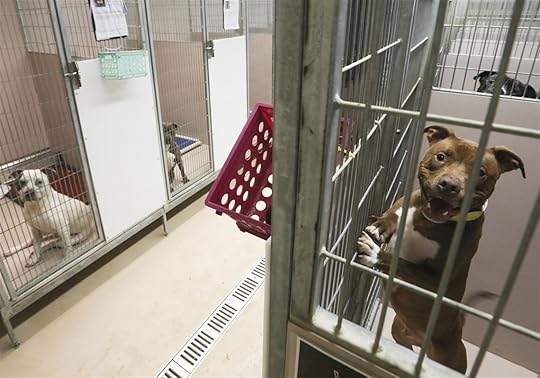
Almost 20 million dogs and cats live in a home that is not current on their rent or mortgage payments according to a recent survey and with a moratorium on eviction set to expire at the end of this month if Congress and the incoming Administration do not act, we may be on the verge of a crisis.
What can shelters do to prepare? At a minimum, expand pet retention programs, foster care networks, and rescue partnerships. They could also go further, such as partnering with boarding facilities and developing services that help people rehome animals themselves.
But there is also one big effort that would go very far in mitigating the crisis: eliminating housing discrimination for people whose families include a dog, cat, or other animal companion. A study determined that doing so would allow 8.75 million animals to find new homes, roughly six years worth of killing in U.S. pounds. Even before the pandemic, it found that one in four renters lost their home because of a restriction on housing.
Although the study did not propose a legislative solution, The No Kill Advocacy Center has long called for protecting pets in rental housing by extending existing federal laws prohibiting housing discrimination for families with children to animal companions. In addition, current law that requires owners of properties that are designated for the elderly or handicapped persons and are either subsidized or insured by the U.S. Department of Housing & Urban Development to allow residents to live with a pet should apply more broadly. The No Kill Advocacy Center has even written model legislation to do so.
As we face the worst public health crisis since 1918 and the worst economic crisis since 1933, animals are completely reliant on us for their welfare. We must rise to the challenge according to the gravity of what the occasion demands. Our fellow non-human Americans should be protected from ending up on the street or worse, on death row at a pound that does not take its obligations seriously.
————-
Have a comment? Join the discussion by clicking here.
January 8, 2021
This Week in Animal Rights (Jan. 4, 2021)
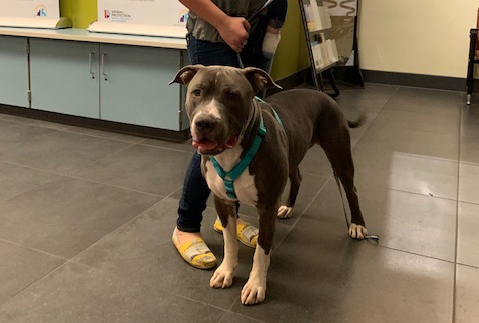 Gumdrop is “the first pit bull adopted out by the Denver Animal Shelter in more than 30 years.”
Gumdrop is “the first pit bull adopted out by the Denver Animal Shelter in more than 30 years.”Legislation to ban continuous chaining of dogs (or cats) was introduced in Florida. The rate of adoption and fostering across the country has increased dramatically; consequently, deaths are at an all-time low. A dog who spent nearly two years in a Phoenix shelter has found a home. At least 28 and as many as 40 dogs have died after eating contaminated pet food; we can stop this from happening again. A District Attorney announced that he will no longer allow a particular judge to hear animal cruelty cases for betraying “the community’s ongoing efforts to seek justice against those who victimize animals.” Gumdrop is “the first pit bull adopted out by the Denver Animal Shelter in more than 30 years.” And almost 20 million dogs and cats live in a home that is not current on their rent or mortgage payments; here’s what we can do to protect them from losing their homes and their lives.
In case you missed it:
Legislation to ban continuous chaining of dogs (or cats) was introduced in Florida.With more people at home in 2020, the rate of adoption and fostering across the country has increased dramatically. Consequently, deaths are at an all-time low. In South Carolina, for example, “The rate of cats being… [killed] has dropped from 22 percent of those brought in to 13 percent, while the rate of dogs has declined from 11 percent to 7 percent.”.Sarge, a dog who spent nearly two years in a Phoenix shelter, has found a home. What do we owe the animals who arrive in our shelters looking for a second chance? We owe them safe harbor — no matter how many there are and no matter how long it takes to find them a home.At least 28 and as many as 40 dogs have died after eating contaminated pet food. Here’s why this keeps occurring and what we can and should do to stop it from happening again.A District Attorney announced that he will no longer allow a particular judge to hear animal cruelty cases. In issuing his directive, the District Attorney accused the judge of having, “betrayed community standards and community trust. He has made it abundantly clear that he has no use for, does not value, and is biased against… the community’s ongoing efforts to seek justice against those who victimize animals…”Gumdrop is “the first pit bull adopted out by the Denver Animal Shelter in more than 30 years.” His adoption was made possible after Denver residents voted to repeal the city’s three-decade “breed” ban in the last election.
And, finally, almost 20 million dogs and cats live in a home that is not current on their rent or mortgage payments according to a recent survey. And with a moratorium on eviction set to expire at the end of this month if Congress and the incoming Administration do not act, we may be on the verge of a crisis. As we face the worst public health crisis since 1918 and the worst economic crisis since 1933, animals are completely reliant on us for their welfare. We must rise to the challenge according to the gravity of what the occasion demands. Our fellow non-human Americans should be protected from ending up on the street or worse, on death row at a pound that does not take its obligations seriously. Here’s what we can and must do.
————-
Have a comment? Join the discussion by clicking here.
January 2, 2021
This Week in Animal Rights (Dec. 28, 2020)
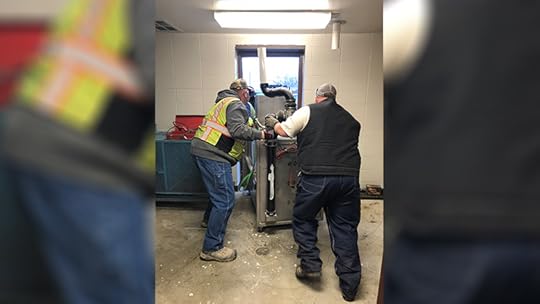 “Rock Springs [WY] Streets Department employees facilitated the removal of the gas chamber from the shelter and also assisted with removing a second gas chamber (which was used prior to the current one) from a nearby storage area. Both gas chambers and a steel cage were then transported to Pacific Steel & Recycling to be crushed and recycled…”
“Rock Springs [WY] Streets Department employees facilitated the removal of the gas chamber from the shelter and also assisted with removing a second gas chamber (which was used prior to the current one) from a nearby storage area. Both gas chambers and a steel cage were then transported to Pacific Steel & Recycling to be crushed and recycled…”Madison became the 11th city in Alabama to ban the sale of commercially-bred animals in pet stores. Mutts are the most popular dogs in America. Greyhound racing comes to an end in Florida. The first dog classified as a “pit bull” goes up for adoption in Denver in more than 30 years. The Los Angeles Times endorses TNR. 1,003,056 animals were adopted during the 2020 Home 4 the Holidays campaign. Hamilton County, IN, had a placement rate of 98% for dogs and 94% for cats in 2019; 2020 was even better. For the first time in history, lab-grown meat goes on sale. Airlines are restricting dogs on flights; they should be expanding them instead. Veganuary is a campaign that encourages people to go vegan for the first month of the year. Oswald was saved by a law that makes it illegal for pounds to kill animals when rescue groups are willing to save them. And, finally, “A monumental day occurred at Rock Springs [WY] Animal Control… as the gas chamber, once used to euthanize animals was removed for good.”
In case you missed it:
Madison became the 11th city in Alabama to ban the sale of commercially-bred animals in pet stores.The Labrador Retriever was named the “most popular” dog for the 30th year in a row. But it isn’t really true. Mixed breed dogs always take the top spot. And it isn’t even close, outnumbering the top 10+ “breeds” on the list combined.Greyhound racing comes to an end in Florida. The final operating track closed its doors after nearly a century of exploitation.The first dog classified as a “pit bull” goes up for adoption in Denver in more than 30 years after residents voted to repeal the ban.The Los Angeles Times endorses TNR, writing that the alternative, “Rounding up tens of thousands of outdoor healthy cats to either kill them or put them in shelters — where they would almost certainly be euthanized — would be barbaric.” Yes it would. And yes it is.1,003,056 animals were adopted during the 2020 Home 4 the Holidays campaign.Hamilton County, IN, had a placement rate of 98% for dogs and 94% for cats in 2019. And 2020 was even better. The shelter announced that “adoption rose 8% over last year and the number of people fostering animals has soared.”A turning point toward ending the single greatest source of suffering on the planet. On December 19, four school kids walked into a restaurant in Singapore and for the first time in history, ordered lab-grown meat.Following new Department of Transportation regulations, airlines are restricting dogs on flights. They should be expanding them instead.Veganuary is a campaign that encourages people to go vegan for the first month of the year. There are a lot of good reasons to do so — your health, the health of the planet, and the reason I went vegan over 30 years ago, the animals.Oswald celebrates his Gotcha Day. He was adopted him six years ago, saved by a law that makes it illegal for pounds to kill animals when rescue groups are willing to save them. The law is needed in all 50 states.
And, finally, “A monumental day occurred at Rock Springs [WY] Animal Control… as the gas chamber, once used to euthanize animals was removed for good. In the past the gas chamber was a tool to assist Animal Control Officers with euthanizing animals, however, with changing times Rock Springs Animal Control has found more humane ways to tackle animal population problems and can do so without the use of carbon monoxide…
“Rock Springs Animal Control’s focus is to manage animal populations through adoption, education, enforcement, and the ongoing spay and neuter program.”
————-
Have a comment? Join the discussion by clicking here.
December 21, 2020
A historic turning point

This weekend marked a turning point toward ending the single greatest source of suffering on the planet. On December 19, four school kids walked into a restaurant in Singapore and for the first time in history, ordered lab-grown meat. It looked the same as chicken, tasted the same as chicken, and was molecularly identical to chicken, because it was chicken. But no chickens were killed. It was instead grown in a bioreactor from chicken stem cells.

While some may balk at food grown this way, it is cleaner. Unlike farmed animals, cultured meat is free of e-coli contamination, disease, salmonella, and other contagions. Technology isn’t just revolutionizing our lives; it will revolutionize — and spare — the lives of billions of animals each and every year. Someday — hopefully within our lifetimes — the technology will allow us to feed billions of people and millions of pets without a single chicken, pig, turkey, or cow being killed. That day cannot come soon enough.
From the moment they are born to the moment their necks are slit, the vast majority of animals raised and killed for food will experience lives of unremitting torment. They will not know contentment, respite, safety, happiness, or kindness. Instead, they will live a short life characterized by inescapable discomfort, social deprivation, the thwarting of every natural instinct and constant stress, all punctuated by moments of agonizing pain, terror, and the deliberate infliction upon them of harm, cruelty and eventually, a brutal and untimely death. Cultured meat would eliminate this suffering.
Until then, whether we are working to end the suffering of animals on “farms,” in “shelters,” on our roads, in laboratories, in mills, on tracks, or wherever else they are killed, let us continue our noble work on their behalf. And together, not only will we save lives; we will create a future where every animal will be respected and cherished, and where every individual life will be protected and revered.
Onward and upward…

If you don’t want to wait for cultured chicken to come to the U.S., All American Vegan, my first cookbook, has a veganized fried “chicken” inspired by a recipe from Claudia Sanders, the wife of the Colonel. A reviewer said that it was so delicious, it made him cry
————-
Have a comment? Join the discussion by clicking here.
December 19, 2020
This Week in Animal Rights (Dec. 14, 2020)
 Capone, a 10-year-old dog who spent 1,134 days in a Pittsburgh shelter, has found a home.
Capone, a 10-year-old dog who spent 1,134 days in a Pittsburgh shelter, has found a home.Dogs identified as “pit bulls” are welcome again in Andover, KS. The Miami-Dade Commission voted to require that, “the County protect and care for all animals impounded at County-operated shelters.” Capone, a 10-year-old dog who spent 1,134 days in a Pittsburgh shelter, has found a home. Jelly Belly has launched vegan gummies. An article in the Washington Post about struggling caused by the economic downturn is noteworthy for one reason – it addresses the impact on dogs and cats. A new study which ranks each state based on the rate of people who die in collisions with wildlife misrepresents the cause and ignores proven solutions. Another recent study found that using punishment to train hurts dogs both short and long term. And the Los Angeles City Council has unanimously approved an Environmental Impact Report that will allow city shelters to sterilize community cats, instead of killing them.
In case you missed it:
Out of the shadows and into the sun. Dogs identified as “pit bulls” are welcome again in Andover, KS. The City Council repealed its ban.The Miami-Dade Commission voted to require that, “the County protect and care for ALL animals impounded at County-operated shelters,” including “pit bulls” which have long been falsely stigmatized and kept outside of lifesaving efforts in the County.Capone, a 10-year-old dog who spent 1,134 days in a Pittsburgh shelter, has found a home. What do we owe the animals who arrive in our shelters looking for a second chance? We owe them safe harbor — no matter how many there are and no matter how long it takes to find them a home.Jelly Belly has launched vegan gummies. No gelatin (made of skin, tendons, ligaments & bones), no carmine (made from crushed up beetles & other bugs), no ethical bitter aftertaste from using products that harm animals.An article in the Washington Post about struggling caused by the economic downturn is noteworthy for one reason — it addresses the impact on dogs and cats. “The first step in solving any problem is recognizing there is one.”A new study which ranks each state based on the rate of people who die in collisions with wildlife misrepresents the cause and ignores proven solutions.Another recent study found that using punishment (including yanking on leash, scolding/yelling, shock collars, restraint) to train dogs not only hurts dogs in the short term, it causes long-term stress, fear, and diminished welfare.
And, finally, after 11 years of inaction due to bureaucratic inertia and official indifference, the Los Angeles City Council has finally approved an Environmental Impact Report that will allow city shelters to sterilize community cats, instead of killing them. The EIR was deemed necessary following a 2009 lawsuit by nativist organizations. The end result was that any cat deemed “feral” was systematically put to death, the City could not even refer people to TNR groups, nor could it provide trap rentals or spay/neuter vouchers for feral cats. As a result, there has been “almost a straight-line increase in neonate intake and killing coinciding with the injunction.” Although the City could have complied very quickly, they stalled for better than a decade. There is now light at the end of a long, dark tunnel.
————-
Have a comment? Join the discussion by clicking here.
December 12, 2020
This Week in Animal Rights (Dec. 7, 2020)
 “In the end, I’ve got antibodies and a [rescue] dog…” Time magazine names all rescue animals its “2020 Pet of the Year.”
“In the end, I’ve got antibodies and a [rescue] dog…” Time magazine names all rescue animals its “2020 Pet of the Year.”Dogs identified as “pit bulls” are welcome again in Pasco, WA. A proposed federal law would end greyhound racing nationwide. Every dog is adopted from a Georgia shelter. New York “state lawmakers will be given the sacred power to write the ending for each shelter animal.” Chapo spent two years in an animal shelter before being adopted. An analysis of holiday adoptions, fee-waived adoptions, and adoption screening. A look at whether dogs understand human language. And Time magazine names all rescue animals its “2020 Pet of the Year.”
In case you missed it:
Dogs identified as “pit bulls” are welcome again in Pasco, WA. The City Council unanimously repealed its ban. “All dogs are going to be treated as individuals and only dogs that actually exhibit dangerous behavior will be classified as potentially dangerous.”A proposed federal law would end greyhound racing nationwide.The sound of silence in a Georgia shelter. “That is the sound of every single dog in our adoption center being adopted!!! This has never happened…”“In the next legislative session, [New York] state lawmakers will be given the sacred power to write the ending for each shelter animal.” Will they do the right thing? Chapo spent two years in an animal shelter before being adopted. What do we owe the animals who arrive in our shelters looking for a second chance? We owe them safe harbor — no matter how many there are and no matter how long it takes to find them a home.An analysis of holiday adoptions, fee-waived adoptions, and adoption screening.One article says dogs don’t understand what we are saying; another says dogs can learn to talk. Which is it?
And, finally, Time names all rescue animals its “2020 Pet of the Year.” In the midst of the worst global health crisis since 1918, the American public turned to shelters and rescue groups like never before, with dramatic results. In Texas, for example, Rosenberg Animal Control and Shelter stayed open as an essential service, called upon the community for help, and the community responded with dramatic results, leaving the shelter empty for the first time in its history: “Big dogs are leaving, behavior cases, cats with special needs… No one is being left behind…” When “Adopt, Don’t Shop” hits the mainstream, our movement has arrived.
————-
Have a comment? Join the discussion by clicking here.
December 5, 2020
This Week in Animal Rights (Nov. 30, 2020)
 Despite the fact that he flew to his destination with no problems and is “very well trained and well mannered and gets along with everybody,” Delta Air Lines earlier this year would not let a man’s support dog fly home with him because of their breed discriminatory policy, threatening to strand them at the airport.
Despite the fact that he flew to his destination with no problems and is “very well trained and well mannered and gets along with everybody,” Delta Air Lines earlier this year would not let a man’s support dog fly home with him because of their breed discriminatory policy, threatening to strand them at the airport.“Cultured meat, produced in bioreactors without the slaughter of an animal, has been approved for sale by a regulatory authority for the first time.” Greyhound racing comes to an end in Florida; horse racing may not be far behind. Delta and other airlines will not be allowed to ban service animals based on alleged “breed.” Michigan is poised to become the 22nd state to ban BSL. Over 1,000,000 animals in shelters will find “Homes 4 for the Holidays” this year. “A Chicago alderman who long championed the city’s anti-puppy mill ordinance has reversed his position… after he received donations from a… store owner whose business sells primarily purebred and designer dogs.” More than one out of every four people who share their homes with an animal had difficulty getting needed veterinary care because of its high cost. And, finally, a Federal Appeals Court ruled this week that a Texas law prohibiting veterinarians from giving online advice without a physical examination of the animal may violate a veterinarian’s First Amendment rights; a ruling which can help millions of animals.
In case you missed it:
In a worldwide first, “Cultured meat, produced in bioreactors without the slaughter of an animal, has been approved for sale by a regulatory authority… [A]pproval could open the door to a future when all meat is produced without the killing” of animals.Greyhound racing comes to an end in Florida this month with the forced closure of the last remaining track after residents overwhelmingly voted to ban the sport by the end of this year. With the closure of one of the three remaining horse racing tracks, horse exploitation may not be far behind.The U.S. Department of Transportation announced that Delta and other airlines will not be allowed to ban service animals based on alleged “breed.”Similarly, Michigan is poised to become the 22nd state to ban BSL. If passed, H.B. 4035 would prohibit cities from passing or enforcing a law that “regulates a dog based upon the dog’s breed or perceived breed.”Over 1,000,000 animals in shelters will find “Homes 4 for the Holidays” this year, a huge number compared to when the campaign began in 1999.“A Chicago alderman who long championed the city’s anti-puppy mill ordinance has reversed his position… after he received donations from a… store owner whose business sells primarily purebred and designer dogs.”Even before the economic collapse, more than one out of every four people who share their homes with an animal had difficulty getting needed veterinary care because of its high cost. It’s a problem we can solve.
And, finally, a Federal Appeals Court ruled this week that a Texas law prohibiting veterinarians from giving online advice without a physical examination of the animal may violate a veterinarian’s First Amendment rights. The ruling could potentially lead to a massive growth in veterinary telehealth appointments, expanding access to care for animals across the country and globe; expanding access to care for pets living with people of limited financial means by reducing costs for such care; allowing shelters to reduce the number of animals who are surrendered because of medical concerns by helping people resolve those concerns in a cost-effective way; and, improving the care of animals already in the shelter by expanding access for small to medium shelters who do not have onsite veterinarians. In other words, millions of animals stand to benefit.
————-
Have a comment? Join the discussion by clicking here.
Nathan J. Winograd's Blog
- Nathan J. Winograd's profile
- 13 followers



